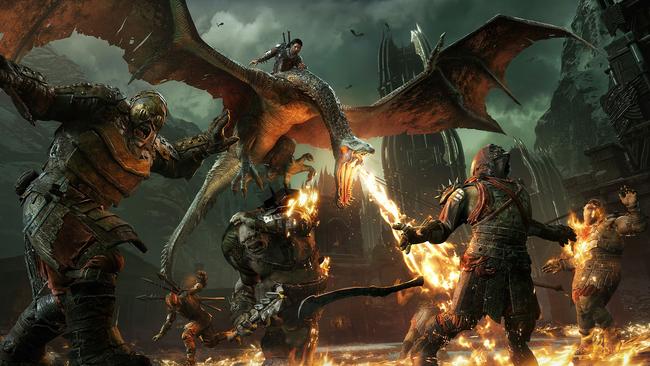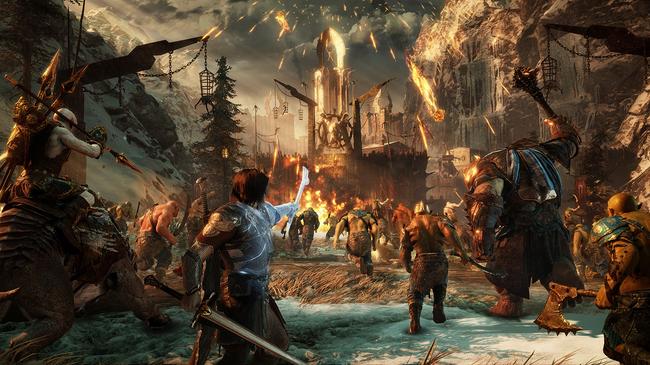
Garry Schyman Talks About Composing for Shadow of War and More
Garry Schyman is quite the force in the gaming industry. As a composer, Schyman has won the British Academy Film Awards for his work on Bioshock Infinite, as well as several other awards from the Game Audio Network Guild and the Academy of Interactive Art & Sciences. Schyman originally started writing for films and television, such as the A-Team and Hit List, but he has now mostly moved on to scoring video games.
Schyman's latest project is Middle-Earth: Shadow of War, which should come as no shock since Schyman also composed the score for the previous title, Shadow of Mordor. RPG Site got the chance to ask Garry Schyman a few questions about his work on Shadow of War, as well as a few other things. Read on to learn more!
Do you know about when in the game's development that you got called in for your musical expertise for Shadow of War?
I was hired in August of 2015, almost two years ago! I didn’t really start until the fall of 2015 and I finished early this year. So I worked on it on and off for about eighteen or nineteen months.
Peter Jackson's adaptations of The Lord of the Rings and The Hobbit were very instrumental in bringing Tolkien's works to the forefront of many minds. Do you draw influence from these movies' musical scores at all for the Middle-Earth games?
Actually not. I had only seen one of the films and it was a good while before I started work on Shadow Of Mordor. So when Nathan Grigg (Monolith’s in house composer and Music director) and I began work on the first game there was no attempt to imitate or borrow from the scores for the films.
I studiously avoided listening to the Howard Shore scores. The execs and Monolith and the Tolkien estate which oversaw our work were totally open to us writing something different and unique to the game experience. The game itself, though borrowing from all the mythology of the books has its own unique story, which I believe really helped allow the entire team to create something inspired by but original in content.

How do you go about creating music that properly sets the scenes for Shadow of War? Are you able to see these scenes in motion first in order to visualize a fitting track, or do you have to compose the music with less information on hand?
I am a contracted composer, meaning I am not an in house employee of the studio (Monolith Games). Plus I live in LA and Monolith is located in Seattle so I can’t just run over to the offices and play the game. But what I do get is great creative direction from Nathan and game play videos relevant to the area of the game I am working on at any particular moment. It’s actually a very common way for non in-house composers to work on games. We get other materials as well, like scripts and long conversations about what is happening in the game, which of course is critical to understanding the nuances. I have always believed that the game studio is the best sources for what is working musically because they are living with the game night and day for months and even years. And of course if I go off in the wrong direction musically they let me know and I can course correct.
How often do you have to work together with other members of the sound team in order to make an overall cohesive sound for the video games you work on?
As I said I work almost every day talking to and getting material from the music director Nathan Grigg. We’ve worked together now on two games and we have a great working relationship. He’s a great composer himself and getting his thoughts on the direction for the score and his input on my music is very helpful. I trust his judgement and he is not heavy handed at all. But when he gives direction it’s very constructive and useful. It’s almost like having a second version of myself giving me great advice and suggestions as I work.
In addition, I occasionally would talk to Monolith’s Audio Director Brian Pamintuan who was always very supportive and helpful. The audio team at Monolith - led by Brian - is awesome and that helps enormously!
Is it difficult to balance melodies that are at the forefront of the scene and tracks that are more background ambiance in games? How do you decide which type of composition to use when it comes to each scene?
The game itself determines the type of music I compose for any particular moment or scene in a cinematic. That in consultation with the development team, especially Nathan Grigg and Brian Pamintuan. It’s a creative decision and sometimes it’s just intuitive combined with a lot of experience.

I have to ask, among every project you've done in your career, which one was your favorite?
There’s something I’ve loved from each project I’ve worked on. Both Shadow games have been amazing to work on. Bioshock, of course, holds a special place in my heart as it permitted me to write such unusual and cool music and elevated my career to permit me to continue working doing something I really love.
Then there’s Dante’s Inferno which allowed me to score Hell. What an amazing palette of images and game play to score. Plus they had the budget to go to London and record with some amazing players!
Is there any particular project, gaming or otherwise, that you'd like to work on?
I would have loved to score the movie “IT”! I don’t know, I love scoring games, films, TV, all three provide such a wonderful creative opportunity for the audio visual composer. Every now and then some film or game or series comes along and I think, that would be such a blast to score. I would have loved to score “The Martian” for instance. But projects come in mysterious ways and I make whatever comes my way the best I can. Sometimes a project that you do not expect to be interesting turns into a fantastic creative opportunity. It’s mostly what you make of it, kind of like life itself!
Middle-Earth: Shadow of War will release October 10 on the Xbox One, PlayStation 4, and Steam.